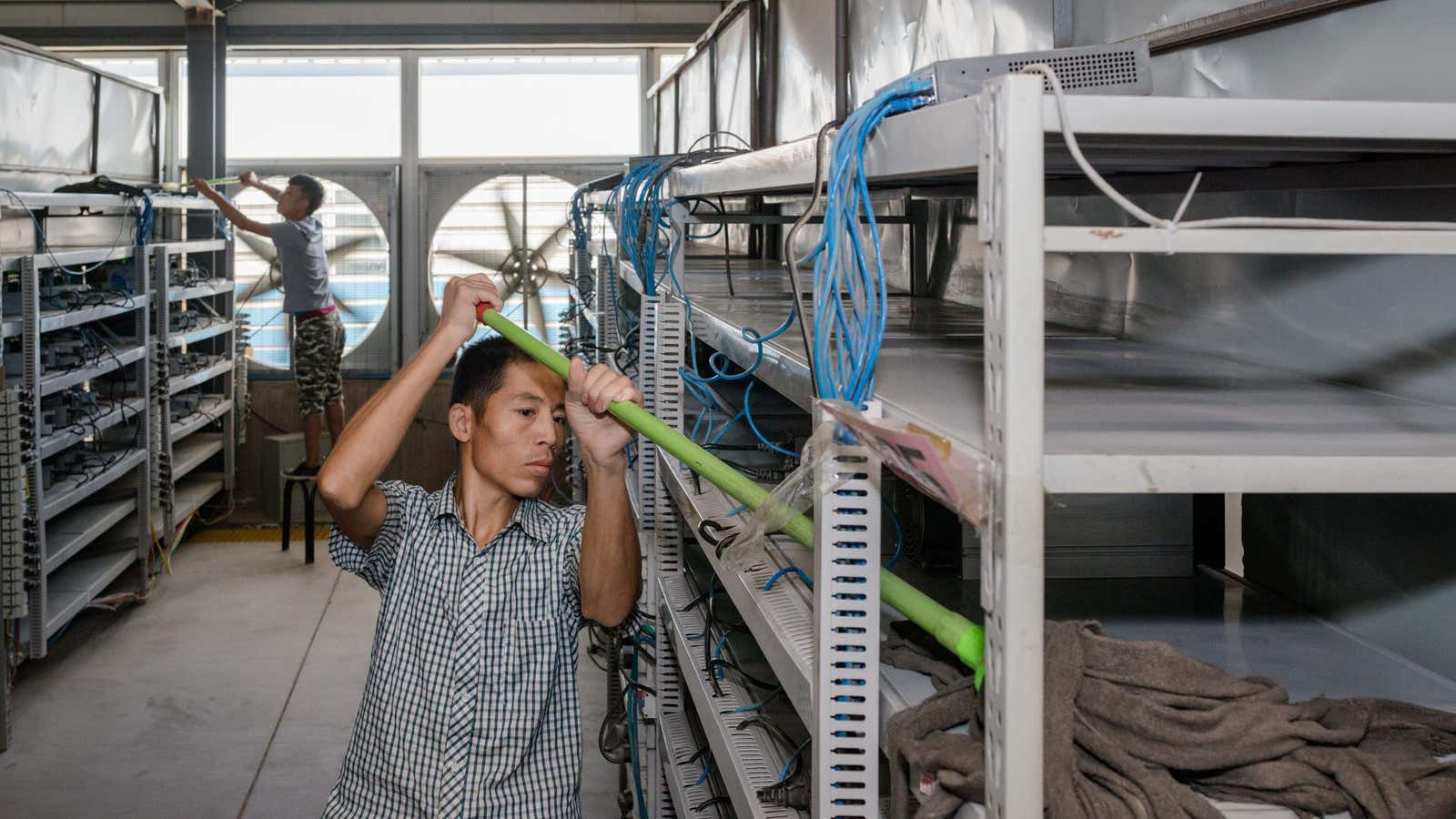Bitcoin mining could be on its last legs in China.
The country’s top internet-finance regulator, the Leading Group of Internet Financial Risks Remediation, issued a notice asking local governments to “guide” bitcoin-mining operations to make an “orderly exit” from the business, according to a leaked document online. Citing government sources, Bloomberg and Reuters earlier reported that China is planning to limit electricity supply to bitcoin miners.
“Currently, there are some so-called ‘mining’ enterprises that produce ‘virtual currencies.’ They have consumed huge amounts of resources and stoked speculation of ‘virtual currencies,’” according to the document dated Jan. 2.
The document, issued to local offices of the internet-finance regulator, asks local authorities to use measures linked to electricity price, land use, tax, and environmental protection, among other things, to guide bitcoin miners to quit the business. It also asks the local offices to report information about mining facilities in their regions, as well as the progress of the exits from mining by Jan. 10, and then on the tenth day of every month.
Calls to the contact number on the document went unanswered.
Also leaked online was a separate document from the internet-finance regulator’s Xinjiang office, dated Jan. 4. The document asks the local authority in the western region to report miners’ exit progress by the fifth day of each month. It also cited concerns over energy usage and speculation as in the national-level document.
When reached by Quartz in a phone call, Zhang Qiubin from the Xinjiang office confirmed the authenticity of the local document, but refused to comment on the national-level one. But both documents note that the regulatory decisions on bitcoin mining were made during a November meeting between the internet-finance regulator and its local branches.
The Leading Group of Internet Financial Risks Remediation was set up by China’s cabinet in 2016, with Pan Gongsheng, a deputy governor of the Chinese central bank, as its head. Pan said in December that the central bank has made the right decisions in banning initial coin offerings (ICOs) and shutting down local cryptocurrency exchanges. He also predicted the death of bitcoin.
China accounts for more than two-thirds of the world’s processing power devoted to bitcoin mining. It’s also home to some of the world’s leading creators of mining hardware, which usually also operate large mining pools—groups of miners who agree to add up their resources to improve their odds of finding bitcoin.
The latest crackdown on bitcoin mining comes amid China’s efforts to better distribute electricity to places where power is undersupplied. Bitcoin miners have taken advantage of cheap power in coal-abundant areas like Xinjiang and Inner Mongolia in recent years to expand their operations.
It’s also worth noting that Beijing worries about social chaos triggered by small investors who lose money investing in risky financial products, and has cracked down on investment vehicles like peer-to-peer lending and online insurance. Shutting down crypto exchanges would be on its own insufficient to curtail the hype around bitcoin and other cryptocurrencies, as the documents indicate.
Already, some of the biggest bitcoin miners in China are moving operations overseas, with the US and Canada among popular options. But still, industrial players have doubts over how effective the state crackdown could be: For one thing, local governments have strong incentives to keep big mining firms running in their localities, given the huge tax and electricity bills they pay. An employee with Beijing-based Bitmain, which runs some of the world’s largest mining facilities, told Quartz that the company hasn’t heard anything from the Xinjiang government regarding its mining operations there.
As to mining farms owned by smaller players, especially those in the mountainous areas of Sichuan and Yunnan provinces, simply locating the miners is a near impossible task. A growing number of private owners of hydropower plants in the two regions have begun to operate mining machines themselves as the price of bitcoin has surged, Du Jun, founder of Node Capital, a Beijing-based venture-capital firm focusing on the blockchain industry, told Quartz prior to news of the latest crackdown. “How can you find them?” he asks.
